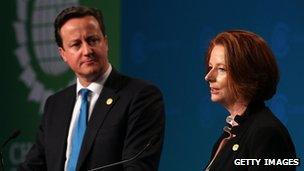David Cameron: EU 'constant attacks' on City of London
- Published

Prime Minister David Cameron is currently at a meeting of Commonwealth leaders in Australia
The City of London is under "constant attack" from EU directives, UK Prime Minister David Cameron has said.
Mr Cameron said the finance industry was a "key national interest" and must be defended.
Speaking in Australia, where he is attending a Commonwealth summit, he also said protecting the single market was the UK's top priority in Europe.
He said markets must be kept open to non-eurozone EU members, should those which use the euro integrate further.
Mr Cameron's comments come after a deal was reached to recapitalise Europe's banks, write off 50% of Greek debt and boost the eurozone's main bailout fund.
'Key national interest'
As part of the agreement, greater fiscal integration is expected among the 17 eurozone countries, but some critics have warned this could leave non-euro EU members like Britain, Sweden and Poland, excluded from key decisions.
At a joint press conference with Australian PM Julia Gillard, Mr Cameron said he wanted to make sure that the single market in Europe was protected.
"This is our key national interest, that Britain, a historic trading nation, has its biggest markets open and continues to have those markets fairly open and fairly governed."
He later told the BBC's political editor Nick Robinson: "In business often it's selling more to your existing customers that's the best strategy.
"We're big sellers into Europe, we can do better in those markets if we liberalise further."
Mr Cameron has vowed to protect the UK's position and said on Friday that the City of London was one "area of concern... a key national interest that we need to defend".
"London - the centre of financial services in Europe - is under constant attack through Brussels directives," he said.
Asked whether he felt those "attacks" were deliberately designed to undermine London's global status, he replied: "Sometimes it's necessary to have regulation but the regulation is badly drafted, badly formed and it doesn't necessarily reflect what large financial centres like London need.
"And of course, all countries in Europe pursue their national interests. Would the French and the Germans like a larger share of financial services in Paris and Frankfurt? Of course they would.
"I want to make sure we keep them in London."
Tobin tax
Stuart Fraser, from the City of London Corporation, welcomed Mr Cameron's comments.
"We've been saying for some time that a deal in Europe, in the eurozone, could marginalise the City and I think it's probably one of the biggest threats we've seen to the City in my career of 40-odd years," he told the BBC.
But Nigel Farage, UK Independence Party leader, accused Mr Cameron of hypocrisy, saying Conservative MEPs had voted in favour of draft legislation which had caused "significant damage" to the City.
The Financial Times reported that Conservative London Mayor Boris Johnson has written to European Commission president Jose Manual Barroso to voice his opposition to a tax on financial transactions.
Mr Johnson says the so-called Tobin tax - proposed by the commission and supported by nations including France and Germany - would hinder London's ability to compete with other financial centres like New York and Tokyo.
"At a time when many EU member economies are struggling, some on their knees, it would be madness to weigh them down with this new millstone," the mayor wrote.
'Level playing field'
Deputy Prime Minister Nick Clegg told the BBC that everyone agreed there had to be better regulation after the "spectacular implosion" in the City of London in 2008 - some of which would have to take place at European level.
"But the devil is in the detail, and some of the details... disproportionately affect Britain compared to other countries and of course we want to make sure there is a proper open level playing field for the City of London and for all British businesses."
Mr Cameron has vowed to use wider changes in Europe's structures to try to rebalance the UK's relationship with Brussels.
The Conservatives want to repatriate powers but Mr Clegg has warned against a lone "smash and grab raid" on Brussels.
The PM said he was "very positive about what the coalition government has agreed, even in areas where the two parties don't necessarily agree" - and he cited as an example the decision to push for a freeze in the EU's budget.
Mr Cameron is attending a two-day summit of the 54-nation Commonwealth, during which economic growth, climate change and human rights will be discussed. It has already agreed to change the laws of succession to the British throne, to give female heirs the same status as males.
- Published28 October 2011
- Published27 October 2011
- Published27 October 2011
- Published27 October 2011